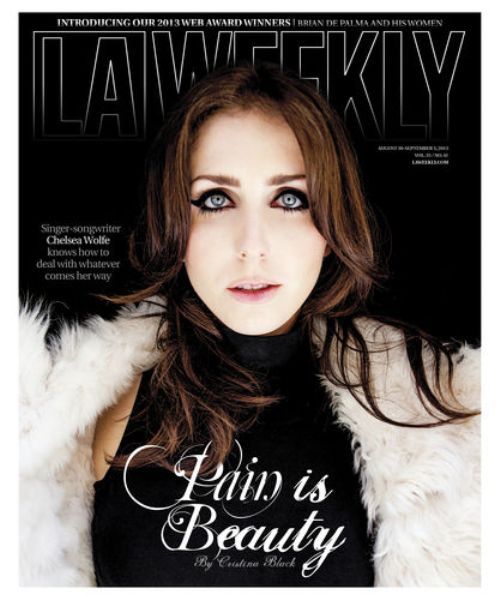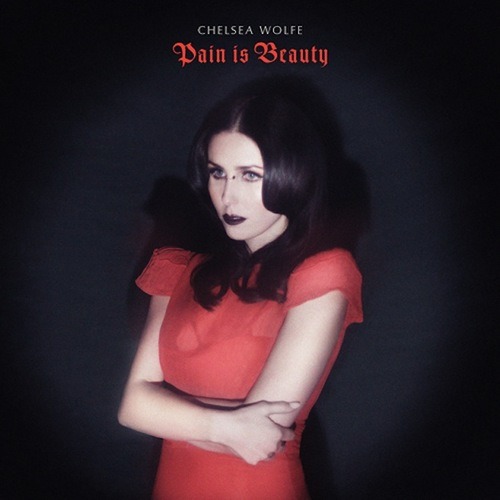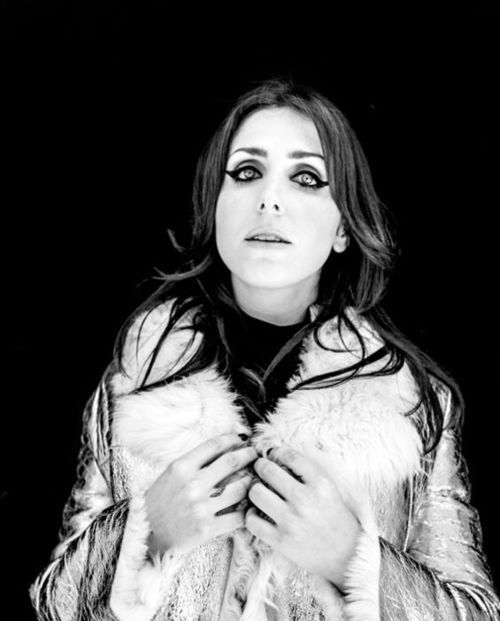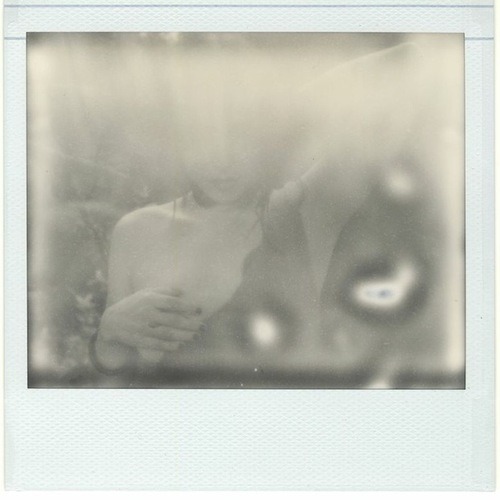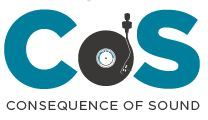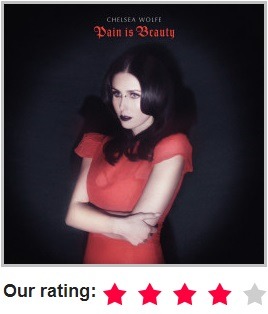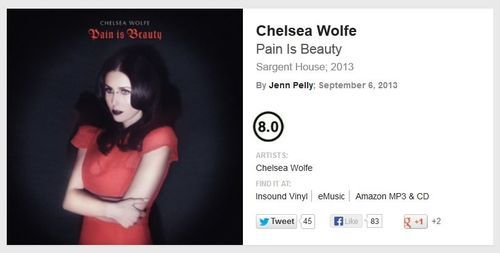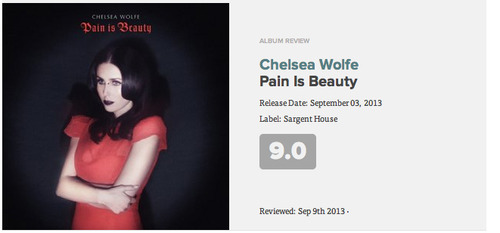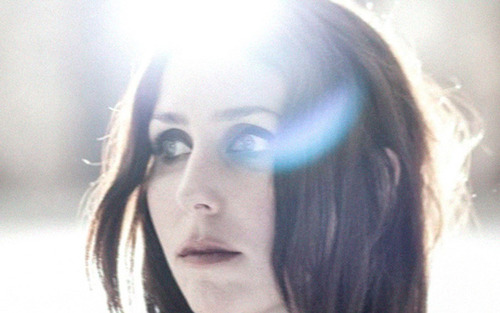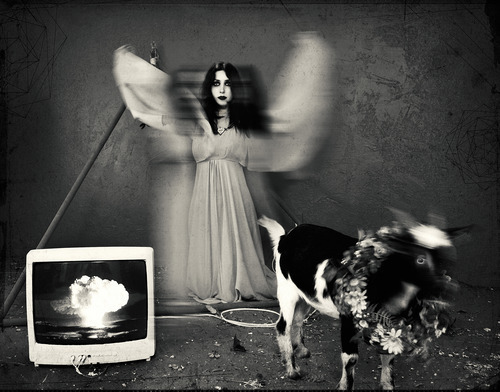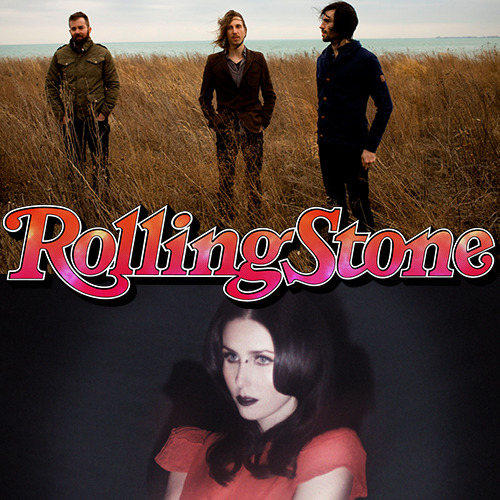Chelsea Wolfe is about to return with her third album Pain is Beauty. It’s a record to which the words “haunting” and “beautiful” do no justice, drenched in a thick, looming atmosphere that doesn’t let up from start to finish.
Since the release of her debut album The Grime and the Glow Wolfe has become well known for her charged, almost frightening take on alternative music. Pain is Beauty steps away from Apokalypsis in some ways, but it doesn’t let up on the Los Angeles based musician’s best asset: her penchant for layered noise build out of her ribcage.
Ahead of the release of Pain is Beauty and our review of it, DrunkenWerewolf’s Tiffany Daniels speaks to Chelsea about recording with her band mate Ben Chisholm, carving something new out of her career and playing live with Queens of the Stone Age.
Hello Chelsea, I hope you’re well! What have you been up to lately and how is album prep coming along?
The album is finished, turned in and getting printed. Lately me and the band have been figuring out how to play these songs live, as it sometimes happens that way… Some songs you play live for a while and then record, some songs you write, record and then have to re-learn for the live set. We’re dealing with that at the moment and trying to work out all the technical kinks along the way. I’ve also been working on film and videos - a short film with a few songs from the new album with director Mark Pellington and a music video shot in the desert for the song “Kings”.
You’re about to release your third studio album Pain is Beauty. How does it compare to Apokalypsis and The Grime and the Glow, in your eyes?
I sometimes don’t think my albums have anything to do with each other because my mental state is so different from one album to the next. The Grime and the Glow was me starting over as a musician, going back to demo-style recording on my 8-track, rebelling against over-produced sounds that I had fallen into when I first started making music. Apokalypsis was a recording that sort of encompassed my live band and I at the time. I would write songs and we would play them at shows and built this sort of energy and I wanted to capture that. That was recorded a long time ago, I think in 2010. Most of Pain is Beauty was recorded in 2012 and grew from a desire to finally release some electronic songs my band mate Ben Chisholm and I had been writing for a few years and also to bring forth some more emotional songs I had inside.
You seem to be a musician who’s very conscious of developing your sound rather than relying on what you know. Would you say that’s fair?
Well, I just don’t like to feel confined to any one sound, genre or style of music. I’ve always been that way and in the past have referred to my music as bipolar or multiple personality because on one album I’ll have an acoustic track, an electronic track, a really gritty sound, a clean sound, etc., but for me I think I bring the songs together with mood and concept. I like to try new things and I like to learn new things, in music and in life.
How did you approach the studio, this time around?
I had the songs recorded in demo version, with most of the parts written. We worked with a great engineer Lars Stalfors at a studio in LA to capture a bigger sound that we could do at the home studio and also to gain some outside insight at times. Then we mixed the album for a good while with Chris Common. For me, mixing is the most important part because you have to remember all the elements and moments that were recorded and bring them together in the right way. I can always see it all in my head but I have to be very conscious and organized so I don’t forget anything.
Was there an aspect of your time in the studio that you consciously wanted to change?
Well I don’t like time limits so I don’t like the pressure of having a strict deadline. Music often works out of time or in slow motion for me so it’s really best if I can take my time to develop everything fully. In the future I’d like to build a better home studio so we can do things on that sort of schedule. I was lucky this time around though to have Chris Common who was very patient with me during the long mixing period.
You worked closely with your bandmate Ben Chisholm on Pain is Beauty. What has he brought to the table?
This project started as and will always essentially be a solo project at heart, but I also have really great bandmates who add so much to the recordings and live experience: Dylan Fujioka (drums), Kevin Dockter (guitars), Ben Chisholm (synths/bass/programming/piano). Ben came along at a time about 3 years ago when I really wanted to add an electronic element to my live band and I didn’t realize then what a great writing partner he’d become. We started writing electronic songs together with the original intent of doing a side project but then we got busy with the Chelsea Wolfe project and as I mentioned, eventually decided to incorporate some of those songs into the album and set. Ben has a great sense of editing. For example, he can take a simple short recording of a voice or violin and within a half hour have it cut up, layered and completely transformed into something totally new and magical. He also created a lot of beats for this new album using only samples of sounds from life around us - like steam and an industrial elevator. And he is a wonderful piano player! Someday we hope to produce other projects together.
Do you find it hard to collaborate objectively with a person that you work with regularly, or do the benefits out way the negatives?
It’s always going to be objective for me, so there’s always going to be some push and pull but we both approach music as our work and take it seriously so we’re willing to put in the time and emotion and energy it takes.
What were your main influences and motivators for writing Pain is Beauty?
Very elemental things like natural disasters, ancestry, the intensity of nature, tormented love. Connection to land and the possibility that the customs and mythology of our ancestors still remains within us through the bloodline. The way humans affect nature and the way that nature can overpower us in a second. The colors of nature. Loss of love in a natural disaster.
The title Pain is Beauty fits in nicely with your goth-influenced sound, but why did you specifically choose it as the name for this album?
It felt like a summary to all the different ideas and themes of the album. I like for a title to sum things up but to also be open to interpretation. For me it sometimes represents a healing process. The new growth that happens in the forest after a fire. The same way in our lives - we go through the fire, we overcome, we grow stronger, wiser, and that to me is beautiful.
You’re about to embark on a huge world tour this autumn. Do you prefer life on the road to life in the studio?
I love recording, even though it’s a tedious process. I think listening to a recording is somehow more intimate than being in a room full of people at a live show, but I also have come to appreciate playing live and seeing other bands live.. I understand it more. It’s taken me a long time to feel even remotely comfortable on stage in front of people, but at times the energy is so powerful, of the space, from the audience, that it all makes sense and it’s so special. I look forward to these tours because I’m excited to play the new songs and introduce a new album to the world, and we also get to tour with some bands I really love - Russian Circles in Europe and True Widow in the US. I also look forward to tour because it’s a vacation from my spider-ridden home in Los Angeles. I live in a very old house and as soon as I start spending too much time there it begins to attack me! I have so many spider bites right now because I’ve been back for the summer. Los Angeles is not really my home, I just work there. I’ll return to Northern California when I can.
What can the world expect from Chelsea Wolfe in the not too distant future?
We’re opening for Queens of the Stone Age on Saturday - one of my favorite bands so that will be a treat. After that we play a festival in Los Angeles and then hit the road for the US tour. I’m already writing new songs in the meantime. Like I said, music never happens in order or in time. I’m writing and thinking about the next album even though I’m in the throes of the current one. I also just spent some time in Seattle recording some more collaborative songs with one of my favorites, King Dude. We released a split 7” earlier this year and will likely have another one in 2014.
CHELSEA WOLFE IS ON TOUR NOW SEE ALL TOUR DATES HERE
















